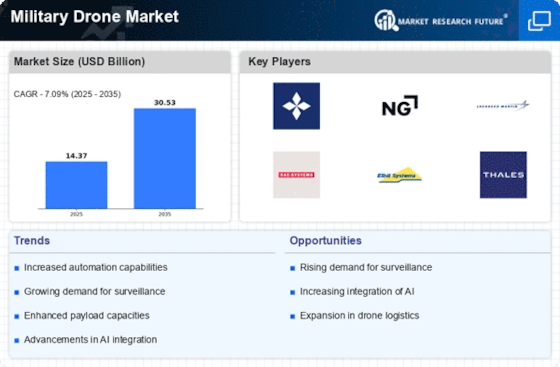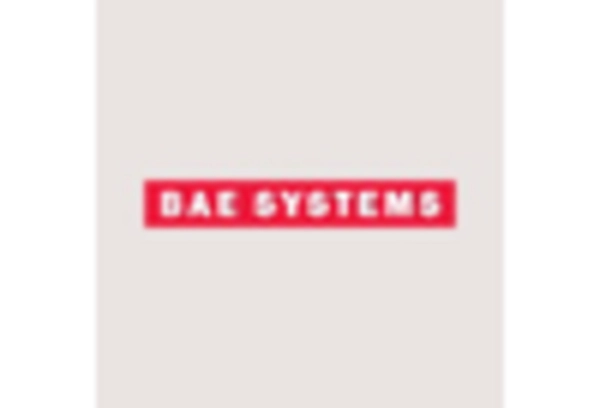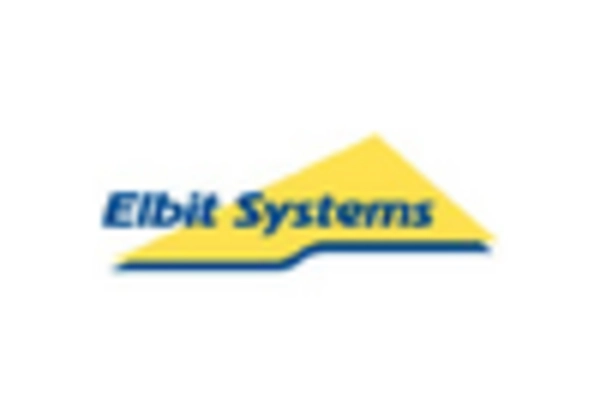Surveillance
Combat
Logistics
Reconnaissance
Training
Fixed-Wing Drones
Rotary-Wing Drones
Hybrid Drones
Miniature Drones
Defense
Homeland Security
Research and Development
Less than 25 kg
25 kg to 100 kg
More than 100 kg
North America
Europe
South America
Asia Pacific
Middle East and Africa
North America Outlook (USD Billion, 2019-2035)
Military Drone Market by Application Type
Surveillance
Combat
Logistics
Reconnaissance
Training
Military Drone Market by Type
Fixed-Wing Drones
Rotary-Wing Drones
Hybrid Drones
Miniature Drones
Military Drone Market by End Use Type
Defense
Homeland Security
Research and Development
Military Drone Market by Payload Capacity Type
Less than 25 kg
25 kg to 100 kg
More than 100 kg
Military Drone Market by Regional Type
US
Canada
US Outlook (USD Billion, 2019-2035)
Military Drone Market by Application Type
Surveillance
Combat
Logistics
Reconnaissance
Training
Military Drone Market by Type
Fixed-Wing Drones
Rotary-Wing Drones
Hybrid Drones
Miniature Drones
Military Drone Market by End Use Type
Defense
Homeland Security
Research and Development
Military Drone Market by Payload Capacity Type
Less than 25 kg
25 kg to 100 kg
More than 100 kg
CANADA Outlook (USD Billion, 2019-2035)
Military Drone Market by Application Type
Surveillance
Combat
Logistics
Reconnaissance
Training
Military Drone Market by Type
Fixed-Wing Drones
Rotary-Wing Drones
Hybrid Drones
Miniature Drones
Military Drone Market by End Use Type
Defense
Homeland Security
Research and Development
Military Drone Market by Payload Capacity Type
Less than 25 kg
25 kg to 100 kg
More than 100 kg
Europe Outlook (USD Billion, 2019-2035)
Military Drone Market by Application Type
Surveillance
Combat
Logistics
Reconnaissance
Training
Military Drone Market by Type
Fixed-Wing Drones
Rotary-Wing Drones
Hybrid Drones
Miniature Drones
Military Drone Market by End Use Type
Defense
Homeland Security
Research and Development
Military Drone Market by Payload Capacity Type
Less than 25 kg
25 kg to 100 kg
More than 100 kg
Military Drone Market by Regional Type
Germany
UK
France
Russia
Italy
Spain
Rest of Europe
GERMANY Outlook (USD Billion, 2019-2035)
Military Drone Market by Application Type
Surveillance
Combat
Logistics
Reconnaissance
Training
Military Drone Market by Type
Fixed-Wing Drones
Rotary-Wing Drones
Hybrid Drones
Miniature Drones
Military Drone Market by End Use Type
Defense
Homeland Security
Research and Development
Military Drone Market by Payload Capacity Type
Less than 25 kg
25 kg to 100 kg
More than 100 kg
UK Outlook (USD Billion, 2019-2035)
Military Drone Market by Application Type
Surveillance
Combat
Logistics
Reconnaissance
Training
Military Drone Market by Type
Fixed-Wing Drones
Rotary-Wing Drones
Hybrid Drones
Miniature Drones
Military Drone Market by End Use Type
Defense
Homeland Security
Research and Development
Military Drone Market by Payload Capacity Type
Less than 25 kg
25 kg to 100 kg
More than 100 kg
FRANCE Outlook (USD Billion, 2019-2035)
Military Drone Market by Application Type
Surveillance
Combat
Logistics
Reconnaissance
Training
Military Drone Market by Type
Fixed-Wing Drones
Rotary-Wing Drones
Hybrid Drones
Miniature Drones
Military Drone Market by End Use Type
Defense
Homeland Security
Research and Development
Military Drone Market by Payload Capacity Type
Less than 25 kg
25 kg to 100 kg
More than 100 kg
RUSSIA Outlook (USD Billion, 2019-2035)
Military Drone Market by Application Type
Surveillance
Combat
Logistics
Reconnaissance
Training
Military Drone Market by Type
Fixed-Wing Drones
Rotary-Wing Drones
Hybrid Drones
Miniature Drones
Military Drone Market by End Use Type
Defense
Homeland Security
Research and Development
Military Drone Market by Payload Capacity Type
Less than 25 kg
25 kg to 100 kg
More than 100 kg
ITALY Outlook (USD Billion, 2019-2035)
Military Drone Market by Application Type
Surveillance
Combat
Logistics
Reconnaissance
Training
Military Drone Market by Type
Fixed-Wing Drones
Rotary-Wing Drones
Hybrid Drones
Miniature Drones
Military Drone Market by End Use Type
Defense
Homeland Security
Research and Development
Military Drone Market by Payload Capacity Type
Less than 25 kg
25 kg to 100 kg
More than 100 kg
SPAIN Outlook (USD Billion, 2019-2035)
Military Drone Market by Application Type
Surveillance
Combat
Logistics
Reconnaissance
Training
Military Drone Market by Type
Fixed-Wing Drones
Rotary-Wing Drones
Hybrid Drones
Miniature Drones
Military Drone Market by End Use Type
Defense
Homeland Security
Research and Development
Military Drone Market by Payload Capacity Type
Less than 25 kg
25 kg to 100 kg
More than 100 kg
REST OF EUROPE Outlook (USD Billion, 2019-2035)
Military Drone Market by Application Type
Surveillance
Combat
Logistics
Reconnaissance
Training
Military Drone Market by Type
Fixed-Wing Drones
Rotary-Wing Drones
Hybrid Drones
Miniature Drones
Military Drone Market by End Use Type
Defense
Homeland Security
Research and Development
Military Drone Market by Payload Capacity Type
Less than 25 kg
25 kg to 100 kg
More than 100 kg
APAC Outlook (USD Billion, 2019-2035)
Military Drone Market by Application Type
Surveillance
Combat
Logistics
Reconnaissance
Training
Military Drone Market by Type
Fixed-Wing Drones
Rotary-Wing Drones
Hybrid Drones
Miniature Drones
Military Drone Market by End Use Type
Defense
Homeland Security
Research and Development
Military Drone Market by Payload Capacity Type
Less than 25 kg
25 kg to 100 kg
More than 100 kg
Military Drone Market by Regional Type
China
India
Japan
South Korea
Malaysia
Thailand
Indonesia
Rest of APAC
CHINA Outlook (USD Billion, 2019-2035)
Military Drone Market by Application Type
Surveillance
Combat
Logistics
Reconnaissance
Training
Military Drone Market by Type
Fixed-Wing Drones
Rotary-Wing Drones
Hybrid Drones
Miniature Drones
Military Drone Market by End Use Type
Defense
Homeland Security
Research and Development
Military Drone Market by Payload Capacity Type
Less than 25 kg
25 kg to 100 kg
More than 100 kg
INDIA Outlook (USD Billion, 2019-2035)
Military Drone Market by Application Type
Surveillance
Combat
Logistics
Reconnaissance
Training
Military Drone Market by Type
Fixed-Wing Drones
Rotary-Wing Drones
Hybrid Drones
Miniature Drones
Military Drone Market by End Use Type
Defense
Homeland Security
Research and Development
Military Drone Market by Payload Capacity Type
Less than 25 kg
25 kg to 100 kg
More than 100 kg
JAPAN Outlook (USD Billion, 2019-2035)
Military Drone Market by Application Type
Surveillance
Combat
Logistics
Reconnaissance
Training
Military Drone Market by Type
Fixed-Wing Drones
Rotary-Wing Drones
Hybrid Drones
Miniature Drones
Military Drone Market by End Use Type
Defense
Homeland Security
Research and Development
Military Drone Market by Payload Capacity Type
Less than 25 kg
25 kg to 100 kg
More than 100 kg
SOUTH KOREA Outlook (USD Billion, 2019-2035)
Military Drone Market by Application Type
Surveillance
Combat
Logistics
Reconnaissance
Training
Military Drone Market by Type
Fixed-Wing Drones
Rotary-Wing Drones
Hybrid Drones
Miniature Drones
Military Drone Market by End Use Type
Defense
Homeland Security
Research and Development
Military Drone Market by Payload Capacity Type
Less than 25 kg
25 kg to 100 kg
More than 100 kg
MALAYSIA Outlook (USD Billion, 2019-2035)
Military Drone Market by Application Type
Surveillance
Combat
Logistics
Reconnaissance
Training
Military Drone Market by Type
Fixed-Wing Drones
Rotary-Wing Drones
Hybrid Drones
Miniature Drones
Military Drone Market by End Use Type
Defense
Homeland Security
Research and Development
Military Drone Market by Payload Capacity Type
Less than 25 kg
25 kg to 100 kg
More than 100 kg
THAILAND Outlook (USD Billion, 2019-2035)
Military Drone Market by Application Type
Surveillance
Combat
Logistics
Reconnaissance
Training
Military Drone Market by Type
Fixed-Wing Drones
Rotary-Wing Drones
Hybrid Drones
Miniature Drones
Military Drone Market by End Use Type
Defense
Homeland Security
Research and Development
Military Drone Market by Payload Capacity Type
Less than 25 kg
25 kg to 100 kg
More than 100 kg
INDONESIA Outlook (USD Billion, 2019-2035)
Military Drone Market by Application Type
Surveillance
Combat
Logistics
Reconnaissance
Training
Military Drone Market by Type
Fixed-Wing Drones
Rotary-Wing Drones
Hybrid Drones
Miniature Drones
Military Drone Market by End Use Type
Defense
Homeland Security
Research and Development
Military Drone Market by Payload Capacity Type
Less than 25 kg
25 kg to 100 kg
More than 100 kg
REST OF APAC Outlook (USD Billion, 2019-2035)
Military Drone Market by Application Type
Surveillance
Combat
Logistics
Reconnaissance
Training
Military Drone Market by Type
Fixed-Wing Drones
Rotary-Wing Drones
Hybrid Drones
Miniature Drones
Military Drone Market by End Use Type
Defense
Homeland Security
Research and Development
Military Drone Market by Payload Capacity Type
Less than 25 kg
25 kg to 100 kg
More than 100 kg
South America Outlook (USD Billion, 2019-2035)
Military Drone Market by Application Type
Surveillance
Combat
Logistics
Reconnaissance
Training
Military Drone Market by Type
Fixed-Wing Drones
Rotary-Wing Drones
Hybrid Drones
Miniature Drones
Military Drone Market by End Use Type
Defense
Homeland Security
Research and Development
Military Drone Market by Payload Capacity Type
Less than 25 kg
25 kg to 100 kg
More than 100 kg
Military Drone Market by Regional Type
Brazil
Mexico
Argentina
Rest of South America
BRAZIL Outlook (USD Billion, 2019-2035)
Military Drone Market by Application Type
Surveillance
Combat
Logistics
Reconnaissance
Training
Military Drone Market by Type
Fixed-Wing Drones
Rotary-Wing Drones
Hybrid Drones
Miniature Drones
Military Drone Market by End Use Type
Defense
Homeland Security
Research and Development
Military Drone Market by Payload Capacity Type
Less than 25 kg
25 kg to 100 kg
More than 100 kg
MEXICO Outlook (USD Billion, 2019-2035)
Military Drone Market by Application Type
Surveillance
Combat
Logistics
Reconnaissance
Training
Military Drone Market by Type
Fixed-Wing Drones
Rotary-Wing Drones
Hybrid Drones
Miniature Drones
Military Drone Market by End Use Type
Defense
Homeland Security
Research and Development
Military Drone Market by Payload Capacity Type
Less than 25 kg
25 kg to 100 kg
More than 100 kg
ARGENTINA Outlook (USD Billion, 2019-2035)
Military Drone Market by Application Type
Surveillance
Combat
Logistics
Reconnaissance
Training
Military Drone Market by Type
Fixed-Wing Drones
Rotary-Wing Drones
Hybrid Drones
Miniature Drones
Military Drone Market by End Use Type
Defense
Homeland Security
Research and Development
Military Drone Market by Payload Capacity Type
Less than 25 kg
25 kg to 100 kg
More than 100 kg
REST OF SOUTH AMERICA Outlook (USD Billion, 2019-2035)
Military Drone Market by Application Type
Surveillance
Combat
Logistics
Reconnaissance
Training
Military Drone Market by Type
Fixed-Wing Drones
Rotary-Wing Drones
Hybrid Drones
Miniature Drones
Military Drone Market by End Use Type
Defense
Homeland Security
Research and Development
Military Drone Market by Payload Capacity Type
Less than 25 kg
25 kg to 100 kg
More than 100 kg
MEA Outlook (USD Billion, 2019-2035)
Military Drone Market by Application Type
Surveillance
Combat
Logistics
Reconnaissance
Training
Military Drone Market by Type
Fixed-Wing Drones
Rotary-Wing Drones
Hybrid Drones
Miniature Drones
Military Drone Market by End Use Type
Defense
Homeland Security
Research and Development
Military Drone Market by Payload Capacity Type
Less than 25 kg
25 kg to 100 kg
More than 100 kg
Military Drone Market by Regional Type
GCC Countries
South Africa
Rest of MEA
GCC COUNTRIES Outlook (USD Billion, 2019-2035)
Military Drone Market by Application Type
Surveillance
Combat
Logistics
Reconnaissance
Training
Military Drone Market by Type
Fixed-Wing Drones
Rotary-Wing Drones
Hybrid Drones
Miniature Drones
Military Drone Market by End Use Type
Defense
Homeland Security
Research and Development
Military Drone Market by Payload Capacity Type
Less than 25 kg
25 kg to 100 kg
More than 100 kg
SOUTH AFRICA Outlook (USD Billion, 2019-2035)
Military Drone Market by Application Type
Surveillance
Combat
Logistics
Reconnaissance
Training
Military Drone Market by Type
Fixed-Wing Drones
Rotary-Wing Drones
Hybrid Drones
Miniature Drones
Military Drone Market by End Use Type
Defense
Homeland Security
Research and Development
Military Drone Market by Payload Capacity Type
Less than 25 kg
25 kg to 100 kg
More than 100 kg
REST OF MEA Outlook (USD Billion, 2019-2035)
Military Drone Market by Application Type
Surveillance
Combat
Logistics
Reconnaissance
Training
Military Drone Market by Type
Fixed-Wing Drones
Rotary-Wing Drones
Hybrid Drones
Miniature Drones
Military Drone Market by End Use Type
Defense
Homeland Security
Research and Development
Military Drone Market by Payload Capacity Type
Less than 25 kg
25 kg to 100 kg
More than 100 kg



















Leave a Comment